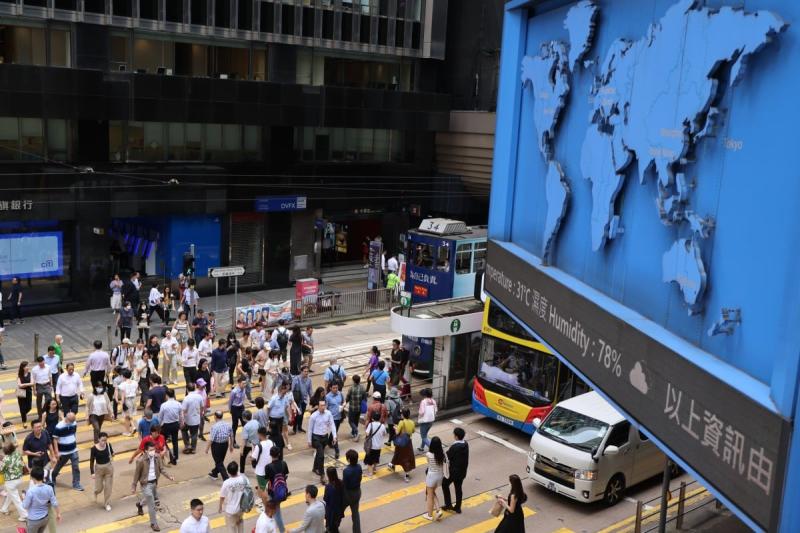By Tu Haiming
The resolution adopted at the third plenary session of the 20th Central Committee of the Communist Party of China calls for more efforts to support the Hong Kong and Macao special administrative regions to build themselves into international hubs for high-caliber talent, a new positioning that sets a high bar for Hong Kong.
To achieve this new goal, which is higher than the city’s previously self-imposed one of developing itself into an international talent hub, Hong Kong needs to have a wider vision, formulate a long-term strategy, and put in more effort.
“International high-caliber talent” refers essentially to scientists, leading figures in science and technology research and development projects, international entrepreneurs, and experts with special talent.
High-caliber talent refers to those at the tip of the “talent pyramid”, who are the main driving force and have great influence in certain fields. They always come with their own teams, bring in new projects, and break new ground.
Hong Kong has put in a lot of effort to attract talent at the mid to lower level of the talent pyramid through its various talent trawling programs, while efforts for attracting talent at the tip of the talent pyramid have been insufficient.
To build an international hub for high-caliber talent, Hong Kong must first have a set of clearly-defined criteria for international high-caliber talent, followed by a coordinated effort of the government and relevant sectors to recruit urgently-needed talent. We must not sit back and expect talent to come to our doorsteps.
In line with international norms, perks such as housing allowances, employee benefits, excellent schooling for dependent children, assistance for community integration, and special care should be offered.
The programs rolled out by the Hong Kong Special Administrative Region government to compete for global talent have offered similar benefits. But what Hong Kong currently offers still falls short of what international high-caliber talent demands or hopes for, and must be optimized. Better perks for such talent will ensure a more enjoyable living experience and save them from unnecessary distractions at work.
First, perks should be listed in detail. For instance, apart from basic fringe benefits such as housing allowance, employee welfare, and excellent schooling for dependent children, Hong Kong needs to come up with some unique benefits that are especially tempting to overseas high-caliber talent.
Second, more effort should be made to serve the needs of international high-caliber talent. While their income can afford them quality services, they still need to queue up for some scarce social resources.
The creation of an international hub for high-caliber talent is exactly the response required to cope with changes in the global development landscape. It behooves the SAR government and business sectors to seriously study the subject and map out a blueprint
Hong Kong needs to think hard about how to prioritize international high-caliber talent in allocating certain social resources. The more they are assisted in Hong Kong, the fewer their concerns and the greater the sense of belonging.
Third, more targeted services are needed to set Hong Kong apart from its competitors in attracting talent. In choosing their destination, such people not only look at the macroenvironment of a city but also what personalized services it can offer. Therefore, Hong Kong should adopt various tailor-made services and benefits for the targeted talent.
An international hub for high-caliber talent should provide them with a convenient platform that allows them to move around and put their expertise to good use. The following efforts will serve this purpose.
First, the government should organize more high-end industry events, which always attract the attention and participation of global talent.
Regular international events offer opportunities for global talent to interact with their local peers.
Second, we should enhance the talent flow between Hong Kong, the Chinese mainland and the rest of the world. The mainland authorities have taken measures to significantly facilitate mainland talent to travel to Hong Kong for exchanges. Under the new arrangements, professionals from Beijing, Shanghai, and nine mainland cities in the Guangdong-Hong Kong-Macao Greater Bay Area who work in scientific research, education, healthcare, legal sectors and other sectors are allowed to visit Hong Kong multiple times within the validity period of their travel permits. To ensure a two-way talent flow, Hong Kong should request central authorities to make it even easier for expats living in Hong Kong to access the mainland.
Third, Hong Kong should expand the platform for innovation and entrepreneurship. The city boasts strong scientific research capabilities, underpinned by five universities in the world’s top 100 and 16 State Key Laboratories, which have established collaborative mechanisms with their counterparts at home and abroad.
For instance, Hong Kong has invested in and launched many projects in the Lok Ma Chau Loop, Nansha and Qianhai, establishing numerous collaborative platforms between Shenzhen and Hong Kong that can facilitate the new endeavors and entrepreneurship of international high-caliber talent. Similar platforms should be expanded to attract more talent to come and stay in Hong Kong.
When Xia Baolong, director of the Hong Kong and Macao Work Office of the CPC Central Committee, met with Hong Kong Financial Secretary Paul Chan Mo-po on July 23 in Beijing, he said that reform and opening-up has been a winning strategy for China to modernize itself, and that reform is also necessary for the SAR to pursue further development in the wake of drastic changes in both the internal and external environments.
The creation of an international hub for high-caliber talent is exactly the response required to cope with changes in the global development landscape. It behooves the SAR government and business sectors to seriously study the subject and map out a blueprint.
The author is vice-chairman of the Committee on Liaison with Hong Kong, Macao, Taiwan and Overseas Chinese of the National Committee of the Chinese People’s Political Consultative Conference and chairman of the Hong Kong New Era Development Thinktank.
The views do not necessarily reflect those of Bauhinia Magazine.
Source: China Daily
https://res.youuu.com/zjres/2024/8/5/XRvekS1o3yoW2CvYSnveE4Q0wqYFtNA0gg7.jpg











扫描二维码分享到手机














